Knowledge Hub
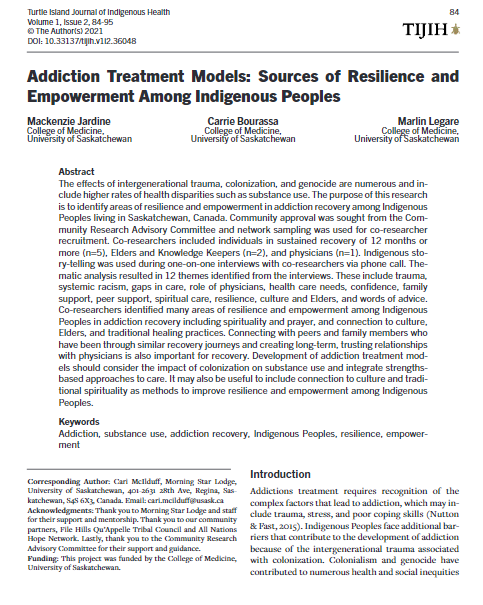
Addiction Treatment Models: Sources of Resilience and Empowerment Among Indigenous Peoples
2021
Author(s): Jardine M, Bourassa C, Legare M.
In this study, Community approval was sought from the Community Research Advisory Committee and network sampling was used for co-researcher recruitment. Co-researchers included individuals in sustained recovery of 12 months or more (n=5), Elders and Knowledge Keepers (n=2), and physicians (n=1).
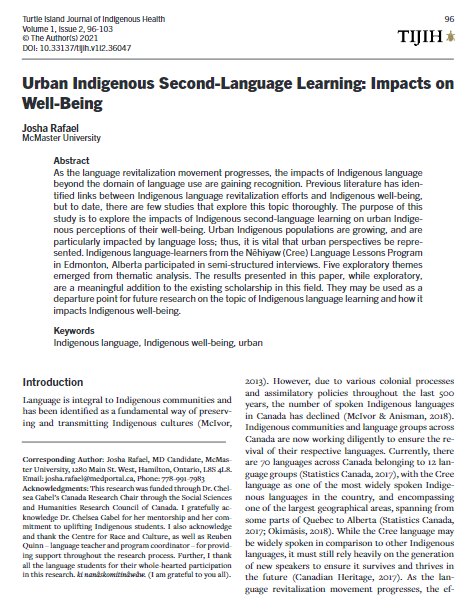
Urban Indigenous Second-Language Learning: Impacts on Well-Being
2021
Author(s): Rafael J
The results presented in this paper, while exploratory, are a meaningful addition to the existing scholarship in this field. They may be used as a departure point for future research on the topic of Indigenous language learning and how it impacts Indigenous well-being.
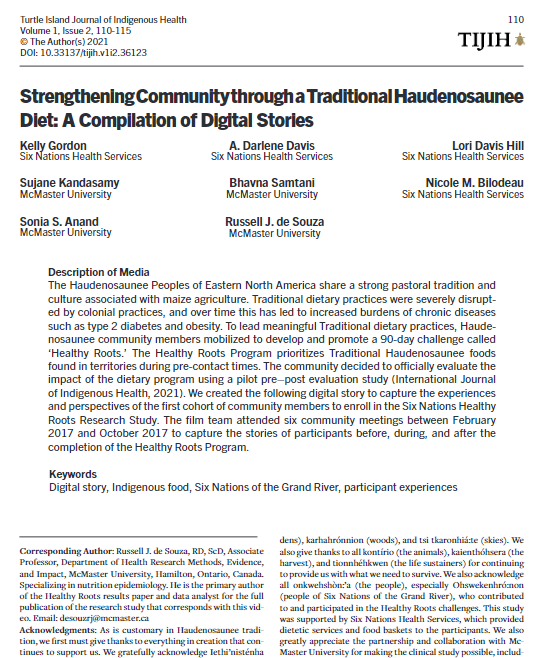
Strengthening Community through a Traditional Haudenosaunee Diet: A Compilation of Digital Stories
2021
Author(s): Gordon K, Davis AD , Hill LD, Kandasamy S, Samtani B, Bilodeau NM, Anand S, Souza RD
This compilation of digital stories (link below) was a unique opportunity to capture the personal experiences of community members as they embarked on a journey to return to a Traditional Haudenosaunee Diet (Healthy Roots Community Initiative). The Healthy Roots Community Initiative was based on the Haudenosaunee Food Guide, designed specifically for this challenge (Gordon et al., 2018). This diet highlights foods that are cultivated in the Traditional Haudenosaunee territory, using Traditional ways of gathering and preparation.
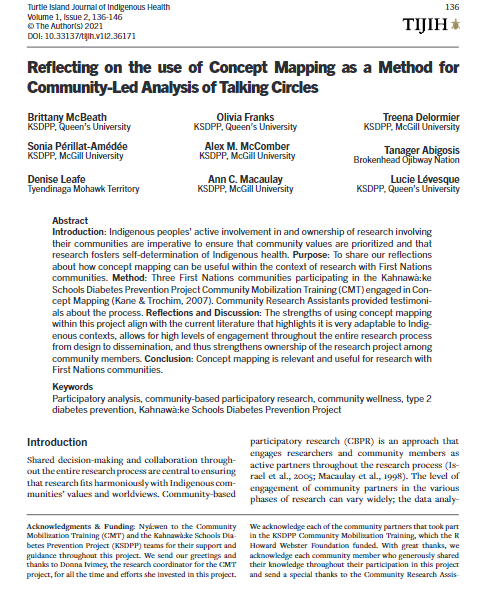
Reflecting on the use of Concept Mapping as a Method for Community-Led Analysis of Talking Circles
2021
Author(s): McBeath B, Franks O, Delormier T, Périllat-Amédée S, McComber A, Abigosis T, Leafe D, Macaulay A, Lévesque L
Shared decision-making and collaboration through-out the entire research process are central to ensuring that research fits harmoniously with Indigenous com-munities’ values and worldviews. Community-based participatory research (CBPR) is an approach that engages researchers and community members as active partners throughout the research process (Is-rael et al., 2005; Macaulay et al., 1998).
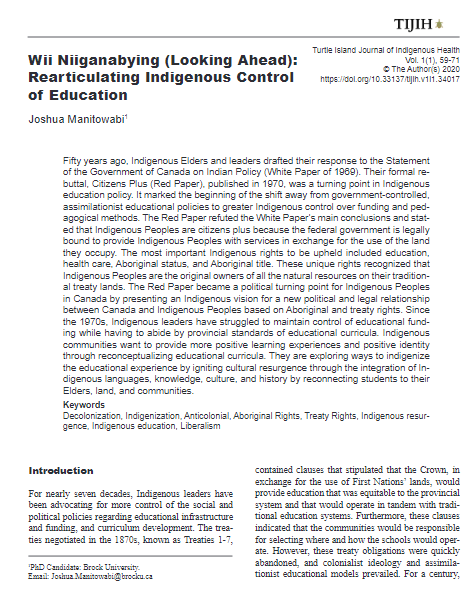
Wii Niiganabying (Looking Ahead):: Rearticulating Indigenous Control of Education
2020
Author(s): Manitowabi J
Indigenous communities want to provide more positive learning experiences and positive identity through reconceptualizing educational curricula. They are exploring ways to indigenize the educational experience by igniting cultural resurgence through the integration of Indigenous languages, knowledge, culture, and history by reconnecting students to their Elders, land, and communities.
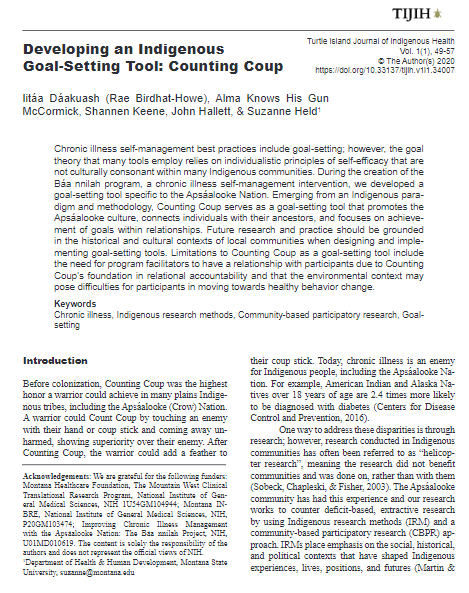
Developing an Indigenous Goal-setting tool: Counting Coup
2020
Author(s): Dáakuash L , McCormick A, Keene S, Hallett J, Held S
Limitations to Counting Coup as a goal-setting tool include the need for program facilitators to have a relationship with participants due to Counting Coup’s foundation in relational accountability and that the environmental context may pose difficulties for participants in moving towards healthy behavior change.
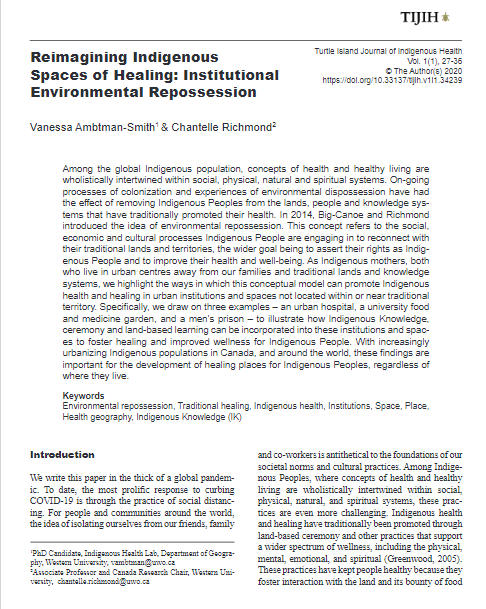
Re-imagining Indigenous Spaces of Healing: Institutional Environmental Repossession
2020
Author(s): Ambtman-Smith V, Richmond C
Specifically, the paper draw on three examples – an urban hospital, a university food and medicine garden, and a men’s prison – to illustrate how Indigenous Knowledge, ceremony and land-based learning can be incorporated into these institutions and spac-es to foster healing and improved wellness for Indigenous People. With increasingly urbanizing Indigenous populations in Canada, and around the world, these findings are important for the development of healing places for Indigenous Peoples, regardless of where they live.
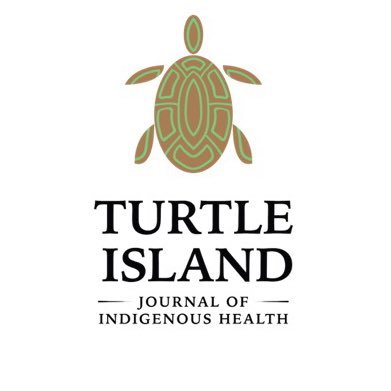
Indigenous Epistemologies, Worldviews and Theories of Power
2020
Author(s): Hickey D
This paper argues that understanding more about epistemologies of power will help illuminate a pathway by which Indigenous Peoples and Canadians of settler ancestry can better understand one another, creating the shift in these relationships that is required in order to gather large-scale support for reconciliation and for ethical distribution of power resources in Canada.
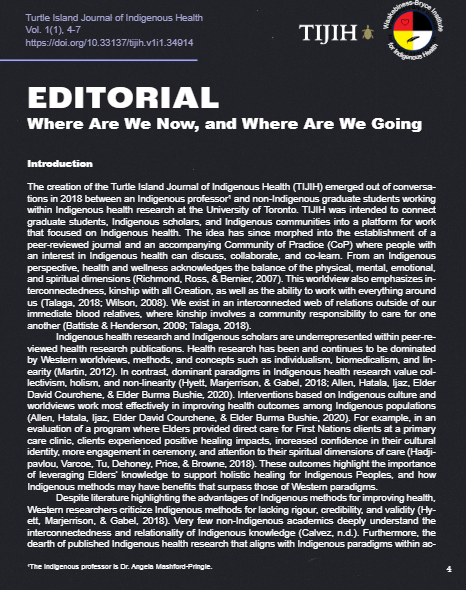
Editorial: Where Are We Now, and Where Are We Going
2020
Author(s): Monteith H, Tan S
Indigenous health research and Indigenous scholars are underrepresented within peer-re-viewed health research publications. Health research has been and continues to be dominated by Western worldviews, methods, and concepts such as individualism, bio medicalism, and linearity (Martin, 2012). In contrast, dominant paradigms in Indigenous health research value collectivism, holism, and non-linearity (Hyett, Marjerrison, & Gabel, 2018; Allen, Hatala, Ijaz, Elder David Courchene, & Elder Burma Bushie, 2020). Interventions based on Indigenous culture and worldviews work most effectively in improving health outcomes among Indigenous populations (Allen, Hatala, Ijaz, Elder David Courchene, & Elder Burma Bushie, 2020). For example, in an evaluation of a program where Elders provided direct care for First Nations clients at a primary care clinic, clients experienced positive healing impacts, increased confidence in their cultural identity, more engagement in ceremony, and attention to their spiritual dimensions of care (Hadji-pavlou, Varcoe, Tu, Dehoney, Price, & Browne, 2018). These outcomes highlight the importance of leveraging Elders’ knowledge to support holistic healing for Indigenous Peoples, and how Indigenous methods may have benefits that surpass those of Western paradigms.
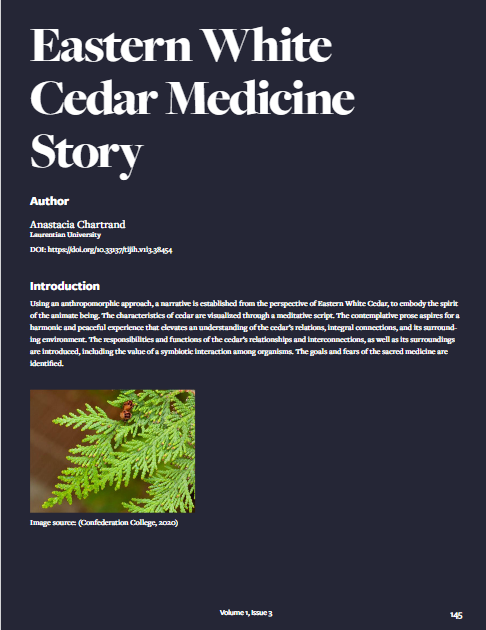
Nature’s kindness is vast and abundant, always available to assist and support, even when threatened. The interpretation of the Cedar story can remind us of the interconnectedness of all things on Earth and leave us feeling compelled to live in harmony with the Earth on a visceral level.



